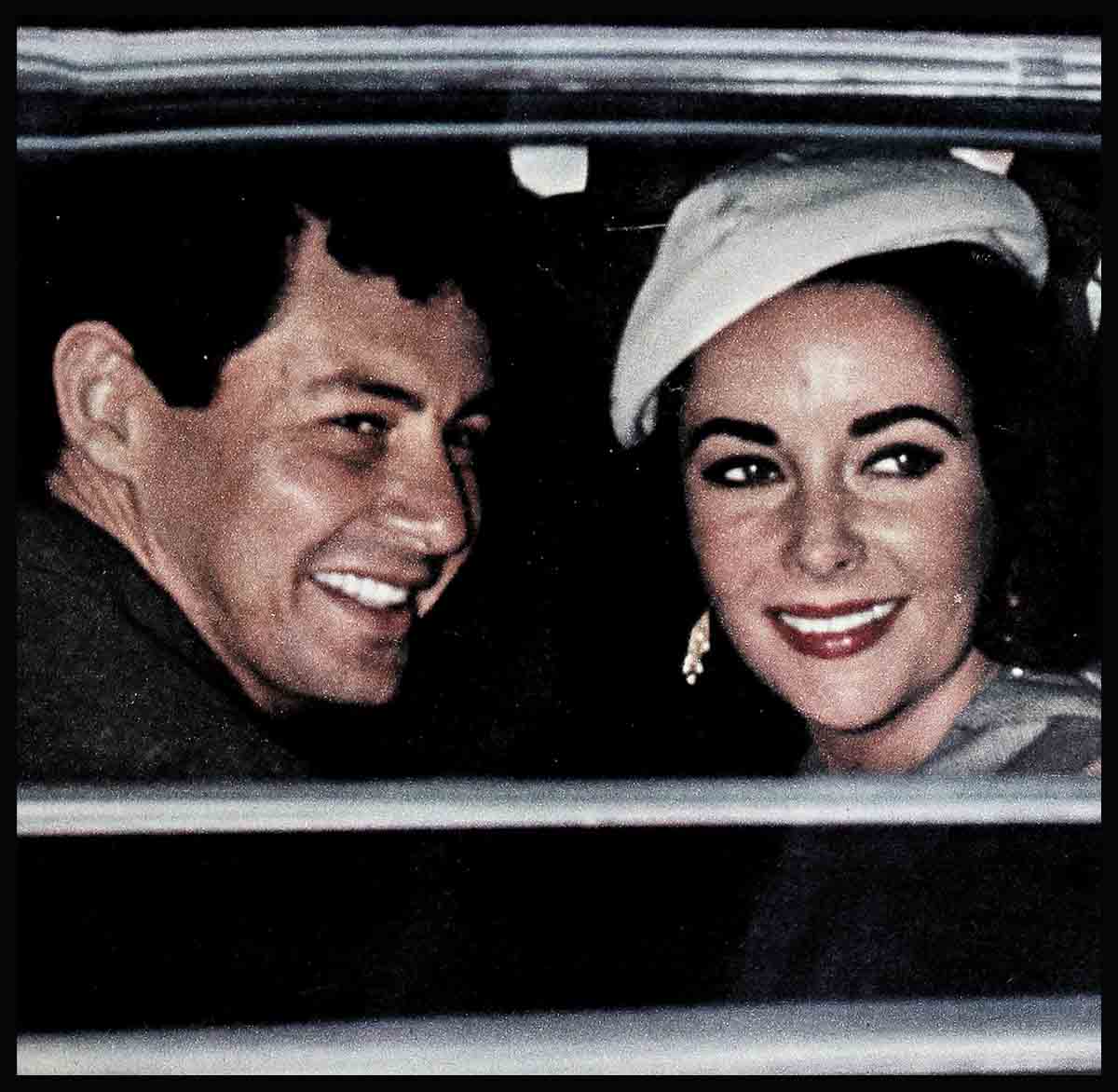
“Our Honeymoon Will Last 30 Years”—Elizabeth Taylor & Eddie Fisher
The sound of a cabin door suddenly opening behind him made Eddie start in surprise and, turning his head sharply, he looked over his shoulder across the deck. For the past half-hour, he’d been leaning against the railing of the yacht, watching the sailors on the Barcelona quay load bags onto the ship. His face had been thoughtful, almost worried. But now, as he saw Liz coming through the doorway, he smiled.
“Hi,” he said, looking approvingly at the comfortable turtle-necked sweater, denims and sneakers that had replaced the more formal dress she’d worn on the plane from Paris.
She walked over toward him, slipped her hand through his arm and said, “Oh, Eddie—it’s going to be a dream trip . . . I just know it.”
He patted her hand and for a moment they were silent, both watching the men loading supplies. Then the sight of two small, deeply-tanned Spanish boys, chattering and tugging at the sailors each time they came down from the ship, made Liz laugh.
“Wonder what they’re saying,” she said, turning toward Eddie again. “You know, kids are the same the world over . . . full of fun and questions. I bet they want to know where we’re going. Gosh, they look alive and happy . . . Eddie—we’re going to be happy, too. We won’t let anything hurt us, will we?”
“No,” he said, “no. I was just thinking—but no. We’ll be very happy, darling. If we can just keep believing that, it’ll be true.” After all, he told himself, we’ve believed it all this time, through all these months of name-calling, of loss. . . . He looked again at the little Spanish boys and winced.
At that moment, one of the sailors on the quay called out to them. “We’re almost through loading,” he said. “Should be casting off any minute.”
Glancing up at the sky and then out toward the sea, Eddie shouted, “What about the weather? Any news?”
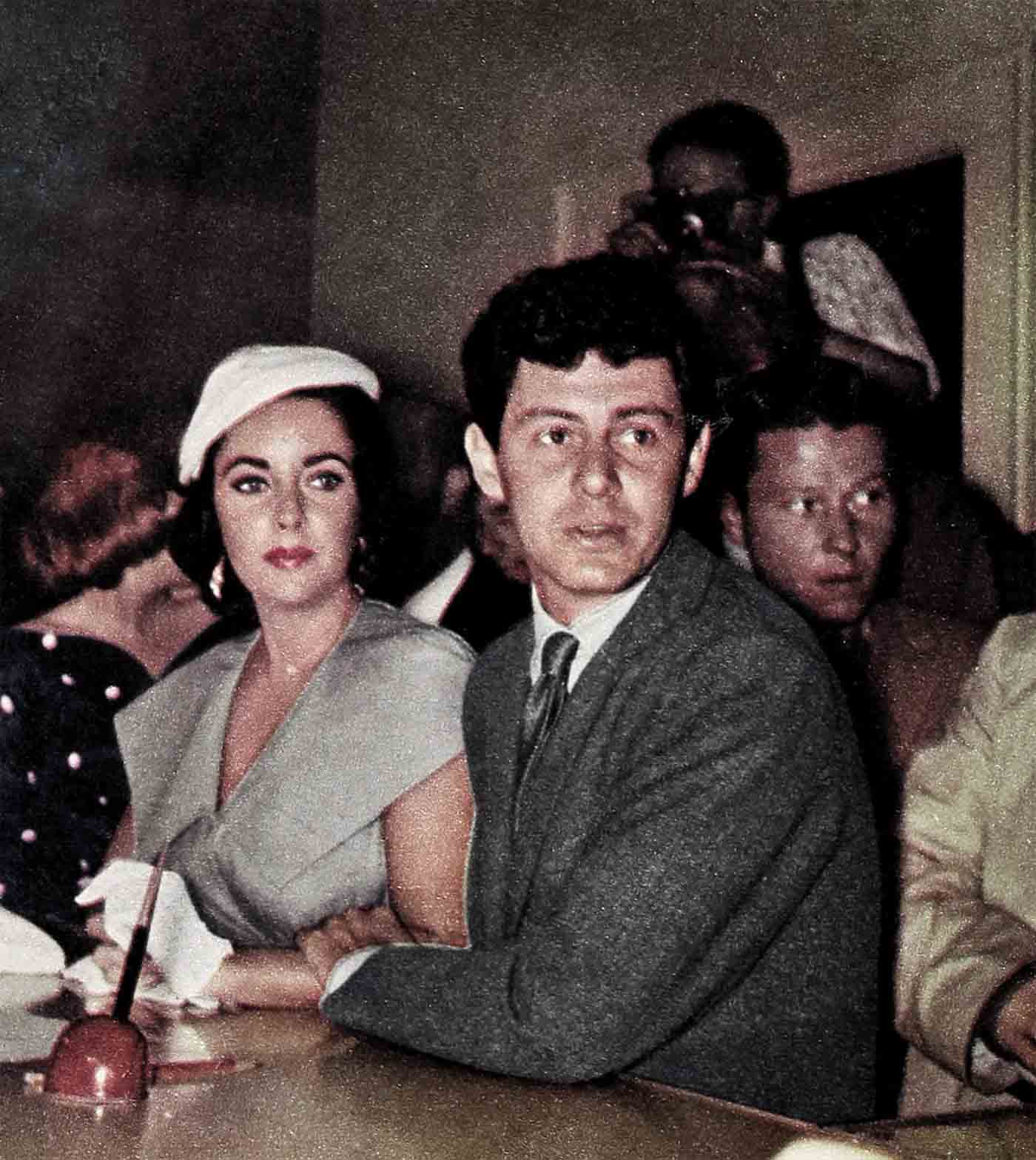
“Skipper had a report just a few minutes ago,” the sailor called back. “Should be fair and sunny—the outlook’s very promising.”
“Good,” said Liz, pushing back a stray curl that had blown loose in the breeze. “Let’s hope it stays just this way . . . no storms . . . no troubles . . . and clear sailing ahead.”
Eddie nodded, but he looked thoughtful again for a moment. “It will stay this way,” he reassured her, and he thought, It must. This happiness had been bought with too much sacrifice not to last forever.
“Oh, look!” He pointed to the sailors untying the ropes binding the yacht to the shore. “We’re casting off already.”
“Off and away to France.”
Putting one arm around her, he turned her toward the stern of the ship, the Olnico, as it began sailing slowly out of Barcelona Bay. “Are you happy, Liz?” he asked. “Really happy?”

“More than I can tell you,” she said.
He bent and kissed his bride.
The day that their yacht sailed into the harbor at Cannes was beautiful. In the early morning sunshine, Liz and Eddie relaxed in deep canvas chairs up on deck, watching the Mediterranean fade away behind them and the harbor draw nearer and nearer.
“It’s been wonderful,” Liz said softly. “Somehow, Eddie, each day of our honeymoon is more like a beautiful dream . . . the yacht, the sun, you . . . oh, just everything has been perfect.”
Eddie smiled. “But it isn’t a dream. It’s real, and that’s the most wonderful part of it.” He looked toward the harbor then. “Look,” he said, “we’re almost in. Liz—what about spending the whole day here? Would you like a stroll on the Riviera?”

“I’d love it,” she said. “There’s plenty to see, and the weather’s magnificent. Oh, Eddie . . . I do love you so much, do you know that?”
A short while later, they clambered down the ladder and then both took a flying leap onto the quay. Then, before walking off into Cannes, they turned and waved to the sailors on board. “See you later,” Liz called.
“Much later,” Eddie laughed.
“Come on,” said Liz, dragging Eddie excitedly along. “Let’s look at the shops. Ooooh—there’re so many of them!”
“And we’ll go through every one, if you want to,” he promised, thinking how like a child she was in many ways—yet in others. . . . He closed his eyes for a moment and left the thought unfinished.

They spent the day shopping and, after dinner in a little port-side restaurant, returned to the boat late that night. But the next day high winds swept into that part of the Mediterranean, making the sea treacherous. Eddie stared out of the porthole gloomily, thinking: Can this be an omen? Can this be a sign of trouble ahead for us? And then he shook his head, as if trying to clear away any doubts, any fears he had, so that when Liz joined him at the porthole he was smiling.
“How can you smile?” she asked, plucking at his sleeve. “The weather’s miserable.”
“But we’re not,” he told her.
“No.” She laughed. “That is certainly true. Oh, Eddie, I’m so glad you’re not a moody sort!”
Not moody, he thought, and then: No, I won’t be moody. I won’t worry until there’s a reason to.

“What are we going to do?” Liz asked. “Do you think it will clear?”
He shook his head. “It’s hard to know,” he said. “But I think we’d better put in to port.” Looking at a map tacked up on the wall, he slowly traced his finger down it. “We’re outside Portofino now,” he told her, “an Italian fishing village, and heading toward—” his finger moved a fraction of an inch—“the port of Imperia. I think we’d better put in there.”
“Oh, Eddie—”
How disappointed she looks that it is over, thought Eddie. Of course, it is a shame, but. . . . “I tell you what,” he said, making his voice cheerful. “We’ll dock at Imperia, then take a taxi back to Cannes, pick up the children and then head straight for London.”
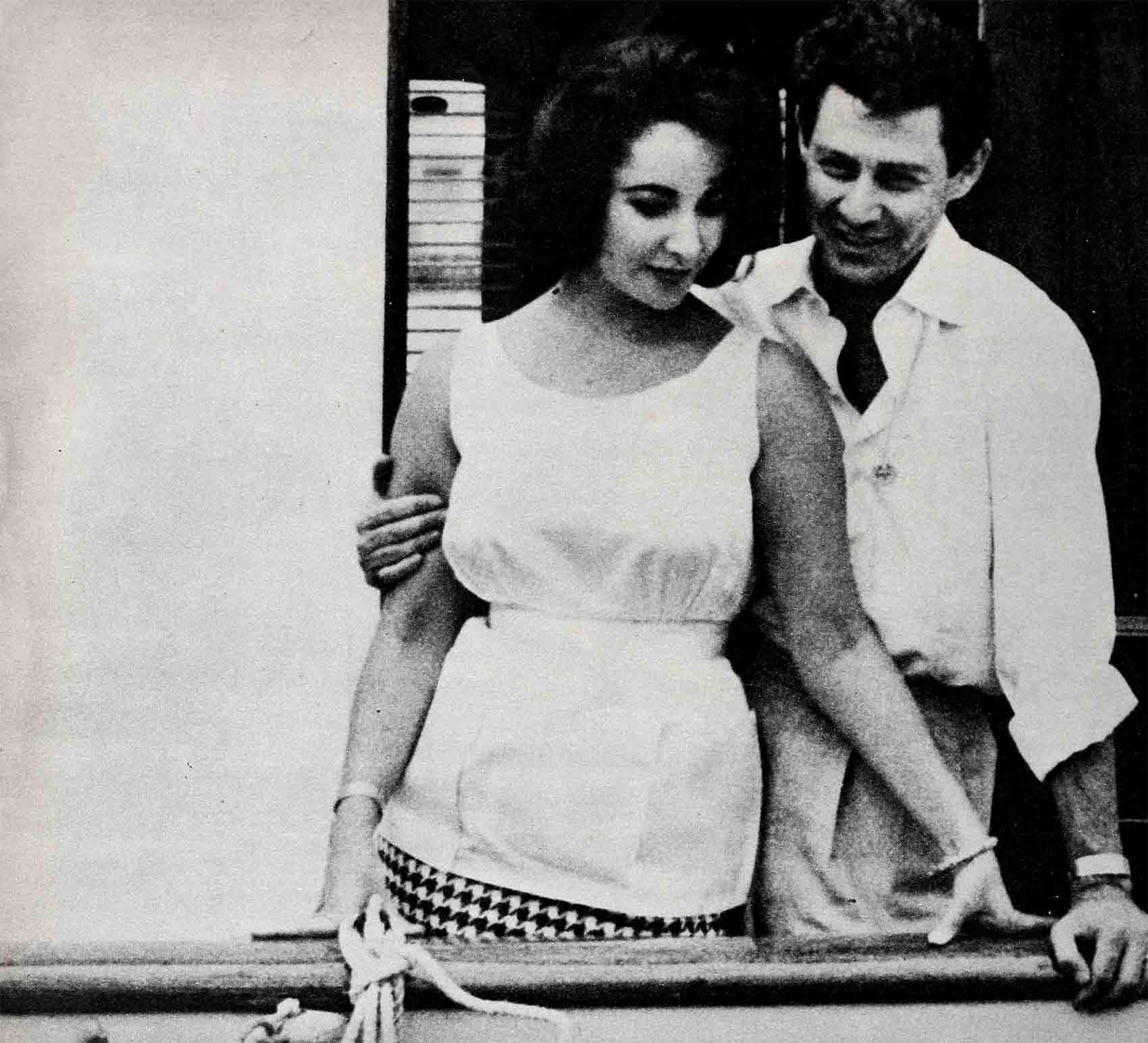
Liz brightened. She would get to see her three children sooner than she’d expected this way. “All right,” she said, “let’s do that. My, won’t Chris and Mike and little Liza be surprised to see us so soon! Oh, Eddie, it’ll be fun!”
But it was not fun.
When they passed through French customs on their way to London, they ran into the first part of a different kind of storm.
The blue-uniformed officer handed Eddie back his passport. “Thank you,” he said and turned to Liz. “And now, Mrs. Fisher, please.”
Liz reached into her shoulder-strap bag, withdrew the green passport and handed it across the customs desk. The officer made a routine check and then, puzzled, looked up at her.
“But this passport says ‘Mrs. Michael Todd,’ ” he said. “I thought you and this gentleman . . .”
“Yes, yes,” Eddie interrupted. “That’s her old passport. There wasn’t time . . .” They’d been in such a hurry. We’ve always been in such a hurry, Eddie thought.
“I’m sorry,” the customs official said, “but you’ll have to wait while we check this through. It’s highly irregular, you know.” He smiled at them apologetically.
And so they had waited. For several hours they’d waited, and then, finally, they’d been cleared. But, somehow, some of the fun had gone out of the trip.
Then, when they reached London Airport late that night, they had no sooner walked down the ramp from the plane than they were hustled into a small reception room where newsmen and photographers were waiting.

Holding tightly onto Eddie’s hand, Liz forced herself to smile. She tried not to seem nervous when they entered the room, but almost immediately the reporters began firing questions at her.
“What about your career—now?” asked one.
“I’m committed to four more films, then I’m ready to give it all up and be a good wife and mother,” she answered slowly, as if weighing each word individually, before speaking the next.
“Haven’t we heard you say that before?” the reporter shot back sarcastically.
“Yes, haven’t we just, though!” said another reporter to his photographer friend.
Liz looked helplessly at Eddie. “But . . . certain things have changed since I—”
Eddie interrupted. “If Liz is happy with her film career, so am I.”
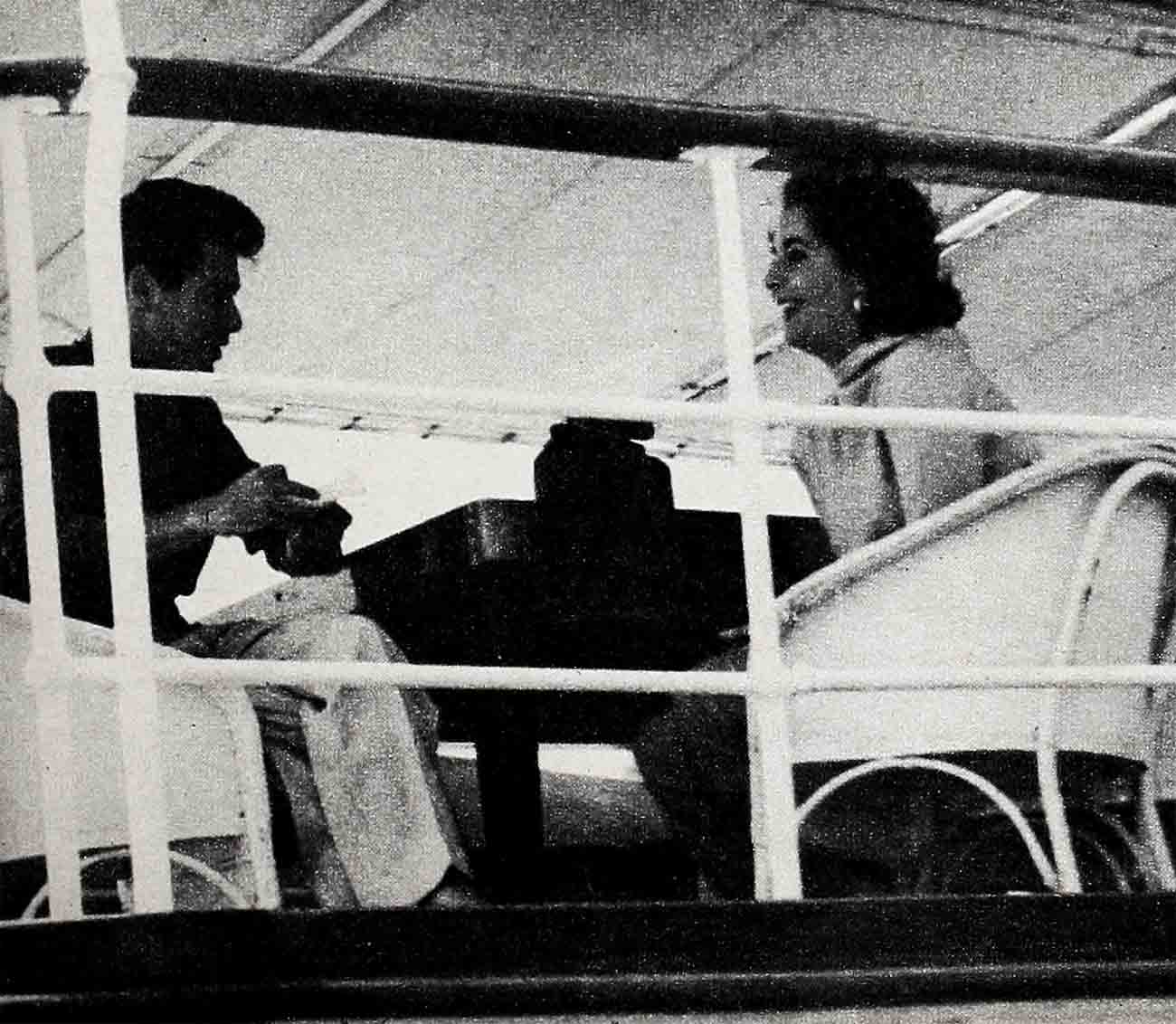
A flashbulb exploded close to his face, making him jump. Moving back a step or two, he went on, “The most important thing is that we both know that to make a marriage successful the two people have to stay together. And that’s what we plan to do.”
The newsmen looked at them in disbelief. “Can’t you answer questions yourself, Miss Taylor?” shouted one.
“Yes, I can,” she said angrily.
“When do you start shooting the picture, Miss Taylor?” someone called out.
“Almost immediately,” she answered. “We—”
“Is it true that the picture will have to be held up until you lose enough weight?” the same man asked.
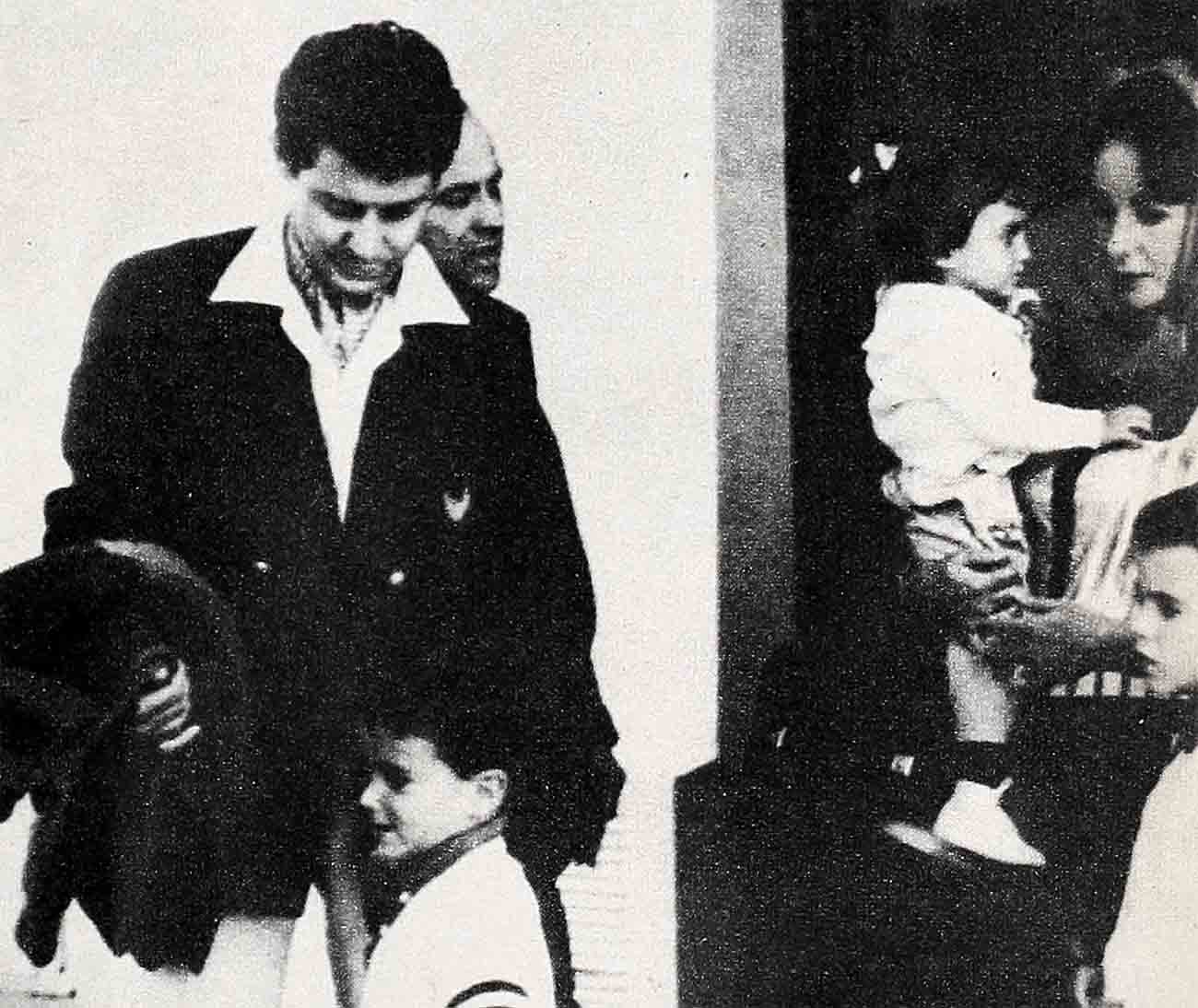
“No,” she protested, “that is . . . I . . .”
“Maybe the part calls for her to be this heavy,’ a man in the back of the room sniggered.
A publicity man, seeing the frown on Liz’s face, stepped forward and announced, “Please, fellows, that’s all for now.”
“Look this way, Liz,” a photographer called, ignoring the announcement. “Say, Liz, are those gray hairs I see?”
“That’s enough, boys,” the publicity man repeated. “The conference is over.”
“So you can’t answer questions, Miss Taylor?” insisted another reporter.
“Yes … yes,” she repeated. She looked confused and hurt as she replied, “But I object to that one,” adding, almost in a whisper, “Won’t you give us a chance?”
Eddie took her by the arm and tried to hurry her out as a photographer screamed, “Look this way, Miss Taylor.”
This was too much for Eddie. Angrily he shouted back, “Mrs. Fisher, you mean.” There was a look of fury on his face as he lunged forward, trying to locate the photographer behind the blinding glare of the arc lights. But it was no use. Finally, feeling defeated, he followed Liz out of the room to a waiting car.
Liz was looking back over her shoulder for him as he came out of the room and she caught hold of his hand. “Eddie,” she whispered. “Maybe . . . maybe one day it’ll all be all right.”
“Maybe,” said Eddie, and, sighing a little, guided her to the car.
“What’s the matter, Mummy?” said Liz’s eldest son, Mike, who was waiting for them in the back seat, bobbing up and down.
“Yes, you look so funny,” repeated his brother, Chris.
“I’m all right,” she told them quietly.
“Then tell us about the house we’re going to?” began Mike.
“Well,” she said slowly, grateful that children can be so quickly satisfied with just a few reassuring words, “it’s a big farmhouse in the country by a huge old castle, where the kings and queens of England sometimes stay. And you’ll have very large grounds to play in . . . and. Liz stopped for a moment, noticing the way their heads were beginning to droop sleepily. “And,” she finished softly, “maybe you’ll even see Prince Charles and Princess Anne when they come to stay at the castle. . .”
In the front: seat, next to the chauffeur, her smallest child, Liza, was already asleep in the nurse’s arms. And so Liz herself leaned her head back against Eddie’s shoulder.
“Take it easy, darling,” he told her. “Everything will be all right.”
Would it? he wondered. He’d worry about that tomorrow, he decided . . . Tomorrow he’d worry about the comments he and Liz would still have to live with—We’ve overcome them in the past, he thought, we will go on doing it . . . He forced himself to think of brighter things. Tomorrow he was going to take the whole family out walking and bicycling in the parks near the house . . . A little thing, perhaps—but important because they had planned it . . . As they’d planned a thousand tomorrows, so that whatever people said couldn’t hurt them. And wasn’t tomorrow the day he’d told Liz he’d try to get tickets for the concert his friend Van Cliburn was giving at the new concert hall in London? He’d even played at Eddie’s house in Hollywood, and Liz had heard Van there. He had said, too, that maybe tomorrow night he’d take Liz to a real English pub . . . And tomorrow Liz would be beginning a new film. Sam Speigel should be calling her about the first arrangements . . . But wasn’t tomorrow also the day when Michael Wilding, the boys’ father, would be planning to come to see them? But tomorrow they would have to open a morning paper and read about tonight at the airport . . . tomorrow . . . tomorrow. . .
He looked across at Liz and he patted her arm gently, trying to reassure her about anything she might be fearing.
“Don’t worry,” he said softly. “Everything will be all right. I’ve made arrangements so that no one will disturb us at the house. You’ll see. In no time we’ll be settled. And as for troubles—we’ll just continue to stare right back at them.” He he sounded more cheerful than he felt.
“Yes,” said Liz, but she looked thoughtful as she stared ahead through the window of the car and out at the road ahead.
A waking the next day, Eddie could hear the children, up early on their first morning in England, anxious to see their new home and the countryside around them. The night before, it had been dark when they arrived at the house and also very late. So they had been sent straight off to bed without even having a chance to explore.
“Look!” he could hear Mike shouting, and Eddie could just picture the three of them kneeling on a wide window seat in one of the downstairs rooms, peering out at the grounds. In front lay acres and acres of wide green lawns, greener than they’d ever seen, he knew. And, over the top of the high hedges at the end of lawns, they would glimpse the quaint slanted cottage roofs of the village of Englefield Green.
“Let’s go outside and play,” he heard Chris say, and then he heard all three of them run outside, shouting and laughing as they went. Smiling, he turned over and went to sleep again.
It was more than an hour later before Liz—dressed simply in an attractive white housecoat—came downstairs with Eddie. They had breakfast alone together before calling the children back inside.
While they sat waiting for them, the children’s nurse knocked on the door and came into the room. “Mrs. Fisher,” she said, looking worried, “I thought I should tell you that there’s no suitable crib for Liza, or a high chair for her, either.”
Before Liz could answer, Mrs. Gratton Storey, the owner of the house, who had been in the room arranging flowers by the window, turned around and said, “Don’t worry, Mrs. Fisher. I’ll go down to the village and buy them. There’s a baby store.”
“That’s very kind of you,” answered Liz quietly.
At that moment, all three children came bursting through the door.
Gosh, they seem happy, Eddie thought, and then he looked at Liz. Did she look a little tired?
“Come on, let’s see the house,” he suggested then, and all five of them began exploring the fifteen-room country home that was to be theirs for at least three months.
When they finally came out of a picturesque attic room, the last one there was to see in the house, Liz sighed. “That was some tour,” she said. “Let me change and then I’ll join you in the garden.”
“Fine,” said Eddie, and then he stopped short by one of the windows. A large crowd had gathered by the main gate leading into the grounds, a crowd that seemed to be growing by the minute. With a heavy sigh, he walked quickly back to his study. “Could you ask one of the policemen to take a message for me?” he called to one of the servants.
Then, after fumbling through a desk in the far corner of the room and finding a sheet of paper, he sat down and wrote out a note. “Mr. and Mrs. do not want to see anyone today. Absolutely no one,” it read.
The policeman knocked at the study door and Eddie handed him the message. “Would you post this on the gate for me?” he asked. “Because I understand from one of the maids that some people are even asking to come in.”
It was only after the policeman had gone to the gate and told the people what Eddie had said, and posted his notice for them all to see, that they were able to spend a day quietly together—just the family. Sometimes I wish nobody knew about us—or cared, Eddie found himself thinking. Not until later that day did they decide to go out. Then, to make sure they wouldn’t be noticed by anyone who still might be by the gate, they used a back exit, driving off through narrow winding country lanes. The children “oohed” and “aahhed” at almost everything—even if it wasn’t very novel. Finally, reaching the secluded green stretches of Windsor Great Park, they all tumbled out and spent an hour there picnicking before coming home.
Two days later, Eddie kept his promise about showing Liz a real old English pub. They’d been up in town talking over the details of the film, when suddenly, on the way home, Eddie slowed the car—apparently in the middle of nowhere—and pulled into a driveway.
“We’re here,” he announced.
“Where . . . what . . . ?” asked Liz in surprise.
“Your pub.” He pointed to an Elizabethian-style building in front of them.
She was all wide-eyed when they went inside, for, even though she had been born in England, she had gone to the States at a very young age—long before she was old enough for a pub. And she hadn’t had a chance to visit one on her other stays in England. Eddie was glad he was able to show things to her, to delight her with new sights, new scenes, new feelings.
It was quite dark inside and the walls were covered with deep mahogany-colored wood paneling. At one end was a long bar, fitted out with high levers. They were faucets for pouring beer, which was kept in barrels beneath the bar, Eddie explained. Small round tables filled up most of the room, although there were booths around the edge.
But Eddie was as pleasantly surprised as Liz at how calm and almost uninterested the “regulars” seemed to be in them. It made Eddie and Liz feel almost like they belonged. “That fellow right next to us doesn’t even seem to know who we are, or if he does—he certainly doesn’t care,” Eddie whispered playfully to Liz. He’d been referring to a very proper, business gentleman in a dark striped suit, who was sipping sherry.
Ten days later it was time to go to the Van Cliburn concert. Liz dressed in a black and white polka-dotted dress, with a matching hat, and with Eddie wearing a light lounge suit, the two of them drove into the heart of London to the impressive new concert auditorium called Festival Hall. Here they heard their friend play. As always, Van put all he had into it.
And from a box high above the platform they listened intently as he performed works by Mozart, Chopin, Beethoven and then a rather jazzy piece by Prokofiev.
And later they went down to Van’s dressing room.
“Wonderful to see you!” Van cried as they went in. But the room was already so crowded that Eddie and Liz had to sit on the side for more than twenty minutes while crowds surged around the pianist.
“It was a wonderful concert,” Eddie told Van when he finally returned. “Every time I hear you play I seem to get something more out of it.”
“Yes, we enjoyed it tremendously,” Liz said, “though I must admit I liked it even more when you played for us at Eddie’s—the seats were more comfortable.” She laughed and Van laughed with her.
Eddie managed to smile a little, but the thought of that house that was no longer his home, and that had been his home for so long, hurt him. But he wouldn’t show it. He’d have to control himself.
“You look wonderful,” Van told Liz.
“l’ve managed to take off eighteen pounds,” she said. “And it wasn’t easy!”
Remembering how she’d eyed his plate piled up with meat and gravy and potatoes, and then how grimly she’d looked at her salad, Eddie chuckled. Life with Liz is never dull, he thought, and slipped his arm around her. Then he looked at his watch. “Hey,” he said, “time to go. Ready, darling?”
No, life with Liz was never dull. A few weeks later, just on the spur of the moment, they’d flown to Paris for the weekend and seen everything together.
When they returned to England, Liz pulled his face down to hers and kissed him. “That was lovely!” she said. “Just like a second honeymoon!”
Eddie held her tightly to him. “No second honeymoons for us, darling,” he said. “Just one. Our honeymoon will last thirty years.” He kissed her again. “Just you wait and see,” he said. “Just you wait and see. . . .”
—ELAINE BLAKE
NEXT FOR LIZ: COLUMBIA’S “SUDDENLY LAST SUMMER,” THEN “TWO FOR THE SEESAW,” SOON TO BE RELEASED BY UNITED ARTISTS. EDDIE’S LATEST RECORD IS THE RCA-VICTOR ALBUM CALLED “AS LONG AS THERE IS MUSIC.”
It is a quote. PHOTOPLAY MAGAZINE SEPTEMBER 1959




